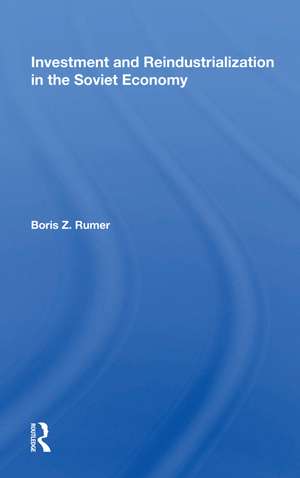Investment And Reindustrialization In The Soviet Economy
Autor Boris Z. Rumeren Limba Engleză Hardback – 7 iun 2019
Preț: 764.20 lei
Preț vechi: 1027.40 lei
-26% Nou
Puncte Express: 1146
Preț estimativ în valută:
146.28€ • 153.68$ • 122.93£
146.28€ • 153.68$ • 122.93£
Carte tipărită la comandă
Livrare economică 11-25 martie
Preluare comenzi: 021 569.72.76
Specificații
ISBN-13: 9780367019914
ISBN-10: 0367019914
Pagini: 162
Dimensiuni: 144 x 229 mm
Greutate: 0.45 kg
Ediția:1
Editura: Taylor & Francis
Colecția Routledge
Locul publicării:Oxford, United Kingdom
ISBN-10: 0367019914
Pagini: 162
Dimensiuni: 144 x 229 mm
Greutate: 0.45 kg
Ediția:1
Editura: Taylor & Francis
Colecția Routledge
Locul publicării:Oxford, United Kingdom
Cuprins
Westview Replica Editions -- Preface -- Patterns of Investment Activity in Soviet Industry in the 1970s -- Renovation Versus Construction: The Focus of Industrial Investment Policy -- Investment Problems in the 1980s -- The East's Share of the Investment Pie And the Role of Siberian Industry -- The Concept of Siberian Industrial Development and Its Implementation -- Perculiarities of Construction in Siberia -- Conclusion
Descriere
Investment activity in the Soviet Union is presently undergoing a decline hitherto unknown in the history of the nation: The growth of capital investment has stopped, while levels of production have fallen. One important factor in this phenomenon is the Soviet policy of reindustrialization—shifting new investments into the expansion and improvement of existing facilities—which severely limits capital available for new construction. In this book, Dr. Rumer examines current Soviet investment policies and assesses their impact on economic development, especially in Siberia. Reindustrialization is intended to combine more rapid amortization for updating and retooling, growth in the volume of industrial output, and minimal capital investment. However, concludes Dr. Rumer, this investment pattern hinders the development of Siberia and thus reinforces the spatial polarization of fuel-energy and raw-material resources in the east of the country and the manufacturing industry in the west, with serious consequences for Soviet strategic/military vulnerability and for the Soviet economy.
